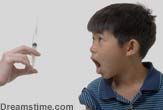Autism and Vaccines: Why Bad Logic Trumps Science

The link between childhood autism and vaccines has, once again, been refuted. A large study by Columbia's Mailman School of Public Health Center for Infection and Immunity found no link between measles, mumps and rubella (MMR) vaccine and autism cases. For many in the medical community, the issue is now closed.
But why do many people continue to believe that there is a link despite overwhelming evidence? The answer is something that has more credibility than the best scientific study: personal experience.
Many parents came to believe that vaccines caused their children's autism because the symptoms of autism appeared after the child received a vaccination. On a psychological level, that assumption and connection makes sense; but on a logical level, it is a clear and common fallacy with a fancy Latin name: post hoc ergo propter hoc ("after this, therefore because of it").
Because the human mind seeks connections, people often misattribute causes, thinking that, "B happened after A did, so A must have caused B." The child was fine until he was vaccinated, and soon he showed signs of autism. It makes sense--except that it's not necessarily true. It's like saying "roosters crow before the sun rises, so the roosters must have made the sun rise."
First-year students of statistics are constantly reminded that "correlation does not imply causation." That is, two events that appear to be causally related may not be; there are other possibilities. The appearance of causation may simply be coincidence; or A may have caused B, or B may have caused A; or there may be a third unknown factor relating to A and/or B. Only carefully controlled scientific studies can conclusively tell the difference.
As it happens, autism often first expresses itself in children at about the same time that vaccinations are recommended for those children.
According to lead author Dr. Mady Hornig, "We found no relationship between the timing of MMR vaccine and the onset of autism." In fact, the new study showed that often the first autism symptoms actually preceded the vaccination shots, and therefore could not have been caused by them.
Sign up for the Live Science daily newsletter now
Get the world’s most fascinating discoveries delivered straight to your inbox.
The misunderstanding is made worse by high-profile, non-scientific claims by activists linking vaccines to autism (model and actress Jenny McCarthy, for example, appeared on "Larry King Live" earlier this year accusing medical doctors of ignorance of the facts and hiding evidence). This issue shows why public health policy must be guided by science instead of celebrity — or even personal experience.
Benjamin Radford is managing editor of the Skeptical Inquirer science magazine. He wrote about the media and pop culture in his book" Media Mythmakers: How Journalists, Activists, and Advertisers Mislead Us." His books, films, and other projects can be found on his website.











